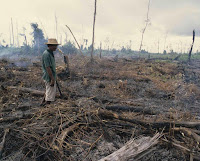UN studies show that the combined effects of degraded farmland and the felling and burning of trees are costing the planet trillions of dollars in ecosystem losses.
The planet’s forests have dwindled by 3% − equivalent almost to the land area of South Africa − in the last 25 years, according to a new assessment by the UN Food and Agriculture Organisation.
While the planet continues to lose its forests – albeit at a slower rate – through felling, burning or being turned into farmland, another UN study predicts that the economic cost of degraded agricultural land in the form of lost ecosystem services now amounts to up to US$10 trillion a year.
Within 10 years, 50 million people could have been forced to abandon their homes and livelihoods to become migrants. If all those people were assembled in one place, they would constitute the planet’s 28th biggest nation in terms of population.
Increasing levels
Forest loss and farmland degradation are both part of climate change accountancy. The rise in greenhouse gases is in part linked to the loss of forest cover to soak up the carbon dioxide released by the burning of fossil fuels.
But increasing levels of heat and drought are likely to accompany climate change, increasing the area of desert or land too arid to support life and industry.
So in losing forest, and in watching farmland become saline because of over-irrigation, or exhausted by intensive cultivation or overgrazing, or simply increasingly too arid to support vegetation, humans are witnessing the loss of all sorts of valuable services not normally recorded by accountants.
Ideas such as “natural capital” and ecosystem services are attempts to place a practical value on things that nature normally delivers for free.
That is because living things – plants and soil fauna in particular – provide food, fibers, medicines and building materials, as well as helping to provide clean water, regulate disease, and recycle nutrients.
The United Nations University report believes that the loss of these services could now be between $6.3 trillion and $10.6 trillion a year in value. This is between 10% and 17% of global gross domestic product.
Read more at Forest Loss and Land Degradation Fuel Climate Crisis

No comments:
Post a Comment